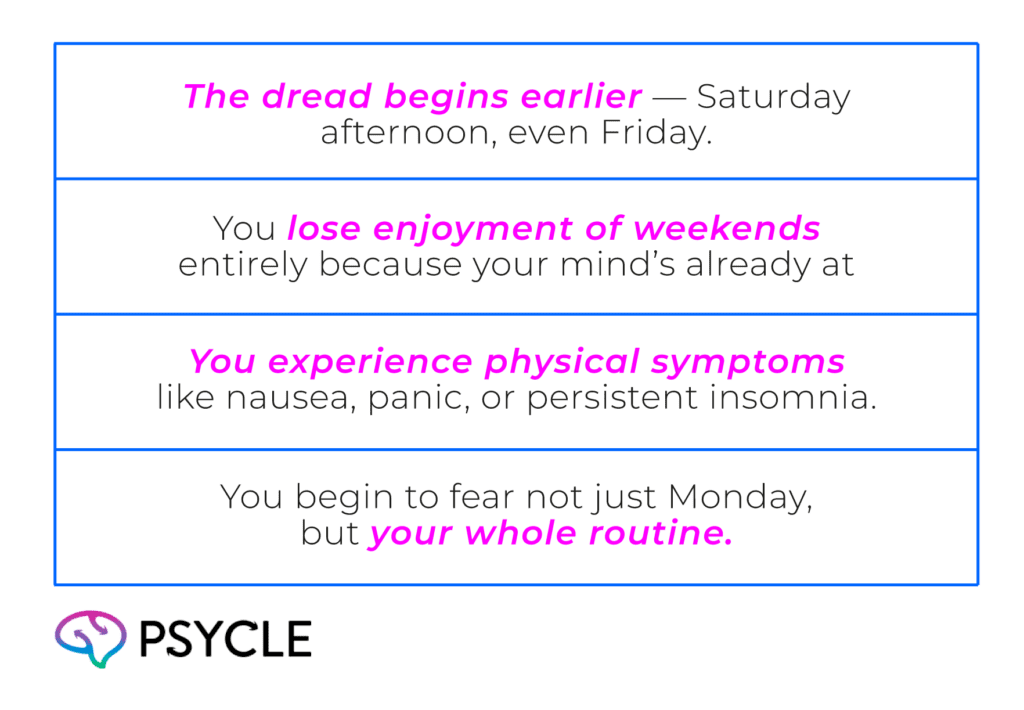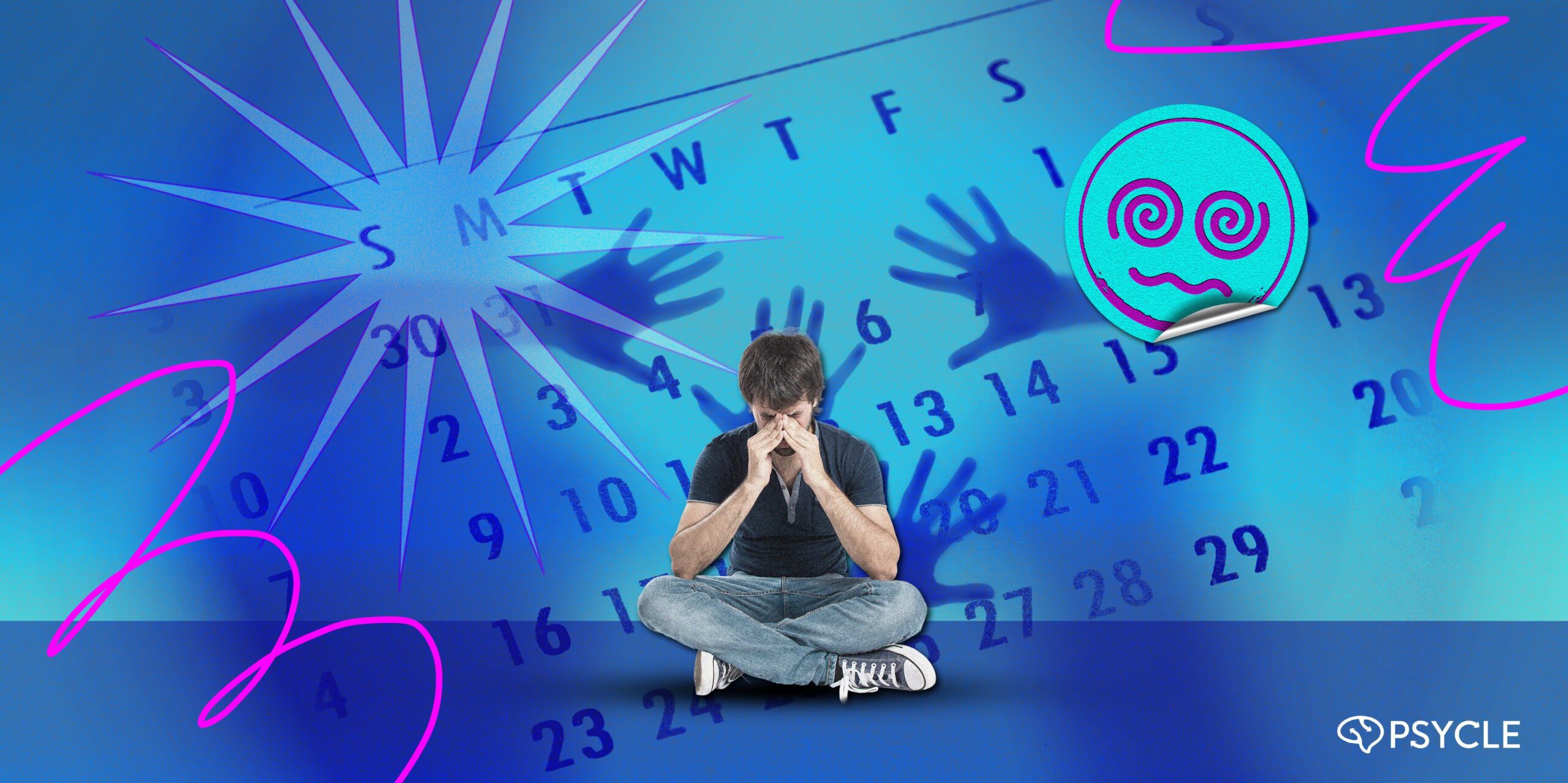Somewhere between the last sip of Sunday morning coffee and the first glance at Monday’s calendar, a shift happens. The air grows heavier, time accelerates, and a quiet sense of dread begins to simmer beneath the surface of your awareness. Those end-of-the-weekend feelings have a name now, the Sunday scaries, and if you feel them, you’re not alone.
Key Takeaways
- Sunday scaries describe pre-Monday anxiety tied to transition.
- They arise from psychological, biological, and cultural pressures.
- Symptoms include emotional, physical, cognitive, and behavioral changes.
- They differ from chronic anxiety and tend to pass once the week starts.
- Recurring dread signals a need for a deeper boundary or lifestyle review.
- Naming them takes away their power; you can meet them with awareness instead of fear.
Sunday Scaries: How It Feels
The Sunday scaries describe the wave of anxiety, restlessness, or low-level panic that can creep in toward the end of the weekend. It’s not the same as a full-blown anxiety disorder. It’s a milder but still potent sense of unease tied to the upcoming week: work, school, responsibility, and the sharp drop from freedom to structure.
Sunday Scaries are like a mental hangover that hits when your body’s still in weekend mode but your mind starts realising you are headed towards Monday with no escape. For some people, the Sunday Scaries show up as a dull background noise you can almost ignore. For others, it’s a full-on mental storm. Either way, it’s a cue that your system is reacting to the transition.
Where Do Sunday Scaries Come From?
The Sunday scaries come from a tangle of real-world factors.
Part of it is psychological: anticipation. Our minds love certainty, and Monday mornings rarely offer that, as they are generally a continuation of things that were left behind on Friday afternoon. There are usually unanswered emails, half-finished tasks, and the unpredictable moods of bosses or clients. Knowing you’re heading towards this uncertainty creates tension. The body enters “brace for impact” mode.
Part of this is cultural. Many of us live in a hustle cycle that glorifies productivity but rarely honors rest. Weekends become a frantic attempt to catch up on everything we’ve missed, errands, social plans, recovery, leaving little real downtime. By Sunday night, our energy’s spent, but our minds are needed to perform on Monday.
Then there’s the biological side. After two nights of sleeping late and eating differently, the body’s circadian rhythm shifts. Cortisol, the stress hormone, starts to rise in anticipation of the workweek, which can make you feel wired, edgy, or on alert. The mix of emotional, social, and physical cues primes the nervous system for unease.
How to Recognise Sunday Scaries
Sunday scaries manifest in a range of emotional, physical, and behavioral symptoms.
- Emotional indicators: Unease, irritability, restlessness, or the feeling of being “off” for no apparent reason.
- Physical cues: Tight shoulders, headaches, fatigue, or a gut that won’t settle.
- Cognitive markers: Racing thoughts, mental lists that loop endlessly, or trouble focusing on what’s actually happening right now.
- Behavioral patterns: Refreshing your inbox “just to check,” procrastinating on simple prep tasks, or numbing out with screens instead of winding down.
A mix of these elements is what most people experience as the Sunday Scaries. It’s a predictable jolt of discomfort that is not enough to count as clinical anxiety, but enough to steal the sweetness from the end of the weekend.
Sunday Scaries: Impacts on Life
The Sunday scaries can make you feel bad for a few hours. Or, in a worst-case scenario, they can quietly reshape your weekend.
While you’re awake, they show your presence. Instead of soaking in your last bit of rest, you drift into the future. You may find yourself half in tomorrow’s meeting, half in the laundry pile you haven’t folded.
They also affect sleep. The mind loops through tomorrow’s to-dos while the body refuses to power down.
And they spill into relationships. You might snap at your partner, withdraw from plans, or carry a low-level irritability that others sense but don’t name. When your nervous system braces for Monday, everything else can feel like too much.
No One Is Immune to the Sunday Scaries
No one is immune. Students feel it before exams. Parents feel it before a packed week of school runs. Professionals consider their approach before a heavy inbox or difficult meeting. Even people who love their work can experience the scaries if their pace leaves no room to breathe.
Certain groups feel it more strongly: high achievers, perfectionists, and those in unpredictable jobs. People with blurred boundaries between work and home, remote workers, caregivers, entrepreneurs, often experience it earlier on Sundays because the week never feels cleanly divided.
But anyone who holds responsibility, cares about outcomes, or simply runs on a tight schedule can feel the shift when freedom contracts back into structure.
Warning Signs of Sunday Scaries
Sunday anxiety can be normal. It turns concerning when it starts to sprawl into the rest of your week.
Watch for these signs:

When the scaries stop being a Sunday blip and become a constant background hum, it’s time to pause and look deeper. That might mean boundaries need resetting, or that you’re heading towards potential burnout, and outgrowing a situation that once felt manageable.
Frameworks for Fighting Sunday Scaries
There’s no one-size-fits-all solution, but there are patterns you can embrace to help ease your transition from weekend to workweek.
To neutralise the Sunday Scaries, consider shifting your frameworks in the long term, rather than relying on quick fixes.
- Emotional regulation: The goal isn’t to eliminate anxiety, but to let it pass through without hijacking your night. That might mean grounding practices, body movement, or simple breathwork that signals safety to your nervous system.
- Planning and boundaries: A little gentle structure can turn Sunday night from a dread zone into a reset ritual. Having a flexible plan for the week, and a clear stop-time for work, helps your brain release control.
- Mindset reframes: Instead of viewing Monday as a threat, some people shift focus toward what’s meaningful about their week. The brain’s storytelling matters; anxiety often softens when the narrative changes.
- Connection and support: Sharing that uneasy feeling normalizes it. Discussing Sunday scaries with a friend, partner, or therapist can help reframe them as a human experience, rather than something shameful that keeps you feeling alone.
The specifics of how you tackle the Sunday Scaries don’t matter as much as the energy behind them: taking a holistic approach with self-trust instead of self-pressure, curiosity instead of criticism.
How Sunday Scaries Can Offer Helpful Feedback
There’s a broad consensus that Sunday scaries stem from how modern work and rest collide. Swinging between extremes is not healthy for anyone, especially the structure of the working week, five days of overextension and two days of collapse, on repeat.
Proper rest involves presence, not weekend escapism, and actual readiness involves pacing, not springing back into the working week in panic.
Mental health professionals who work with stress note that the Sunday scaries can serve as helpful feedback. They show us what feels out of alignment: too little rest, too many obligations, or a work structure that no longer fits. Instead of viewing these discomforts as personal failings to mask, they can serve as signals to listen to.
The Future of Work, Weekends, and Sunday Scaries
The Sunday scaries may look different in the years ahead. As remote and hybrid work spread, the boundary between weekend and weekday grows blurrier. That means more people feel the scaries at unpredictable times: Sunday morning, Monday lunch, or mid-vacation.
At the same time, the younger workforce is reshaping boundaries. There’s a cultural movement toward “quiet Sundays,” digital detox, and emotional balance. As mental-health awareness rises, Sunday anxiety might lose some of its sting; not because life gets easier, but because more people name it openly instead of carrying it alone.
The scaries may never disappear, but they can evolve from a secret shame into a shared signal that relaxation deserves as much respect as productivity.
FAQs
What Triggers Sunday Dread Most Often?
Unfinished tasks, lack of rest, and fear of losing control. Even the shift from freedom to structure can activate a subtle fight-or-flight response.
When Should Sunday Anxiety Prompt Seeking Help?
When it stops feeling situational, if dread spills beyond Sunday night, disrupts sleep, or bleeds into every day, professional support can help you rebuild stability from the inside out.
How Can One Track Whether Sunday Scaries Worsen?
Notice patterns. Keep a short weekly note: time of onset, physical sensations, and recovery. If the scars grow earlier, stronger, or longer, that’s data, not failure, showing what needs care.
Sources
- https://www.health.harvard.edu/blog/why-your-sleep-and-wake-cycles-affect-your-mood-2020051319792
- https://edition.cnn.com/2022/08/14/health/sunday-anxiety-weekend-wellness-partner/index.html
- https://business.uq.edu.au/momentum/sunday-scaries
- https://www.researchgate.net/publication/393870172_When_Sunday_Feels_Blue_A_Phenomenological_Study_of_the_Sunday_Blues
- https://guilfordjournals.com/doi/10.1521/jscp.2010.29.1.95
- https://mentalhealth.bmj.com/content/28/1/e301418
- https://lsj.com.au/articles/managing-the-sunday-scaries/
- https://www.youtube.com/watch?v=qTawM7XI1wY
- https://www.youtube.com/watch?v=Z9ZVx85RsGQ

